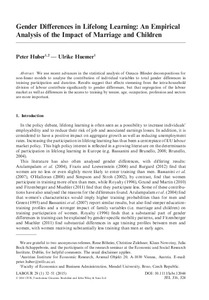Gender differences in lifelong learning: an empirical analysis of the impact of marriage and children

Labour. Review of Labour Economics and Industrial Relations
2015
29
1
March
32-51
continuing vocational training ; gender ; lifelong learning
Education and training
http://dx.doi.org/10.1111/labr.12044
English
Bibliogr.
"We use recent advances in the statistical analysis of Oaxaca–Blinder decompositions for non-linear models to analyse the contribution of individual variables to total gender differences in training participation and duration. Results suggest that effects stemming from the intra-household division of labour contribute significantly to gender differences, but that segregation of the labour market as well as differences in the access to training by tenure, age, occupation, profession and sectors are more important."
Digital
The ETUI is co-funded by the European Union. Views and opinions expressed are however those of the author(s) only and do not necessarily reflect those of the European Union or the ETUI.